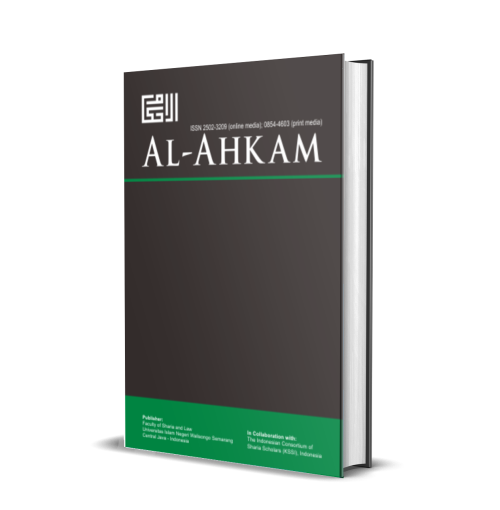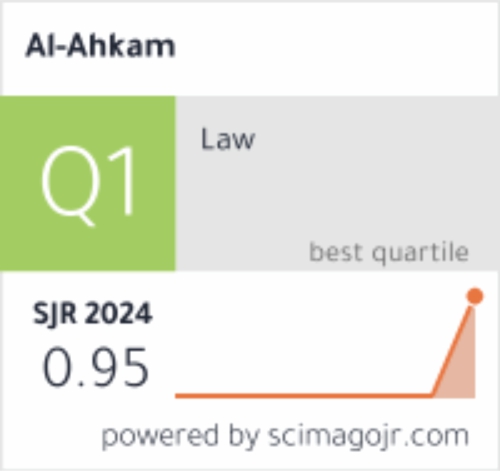The Existence of the Statement of the Companions (Fatwā Ṣaḥāba) and its Ḥujjah in Islamic Legal Thoughts
DOI:
https://doi.org/10.21580/ahkam.2019.29.2.4281Keywords:
eksistence, fatwā ṣaḥāba, ḥujjah, development of Islamic legal thoughtAbstract
Fatwā ṣahāba can be used as ḥujjah (proof) even though the ulama (scholars) have different opinions regarding its validity. The ulama categorize the Companions’ fatwā as one of the sources of law decision which is still being disputed about the validity. It is different from the Qur'an, Sunnah, Ijmā’, and Qiyās that have been agreed by the most of the scholars as a source of Islamic law. The Companions’ fatwā has an influence on the development of Islamic law thought which can be substantially equated like a fiqh, because it is the result of istinbāṭ (efforts to extract the ẓannī (speculative) sharia law from original sources through the mobilization of all natural reasoning abilities) and the results of the Companions ra'y (establish a law of contemporary problems that have not been found in the Qur’an and hadith) which have been codified according to the particular mazhab. Therefore, the Companions fatwā is the result of the ijtihad of the Companions as ulama of the previous generation and became the ḥujjah of the ulama until today who have colored Islamic law thought, such as fatwā of Abū Bakr, Umar, ‘Uthmān, ‘Alī, ‘Abdullāh Ibn ‘Abbās, ‘Abdullāh Ibn Mas'ūd and other Companions. At least the fatwā ṣaḥaba can be used as ḥujjah in istinbāṭ of islamic law when new problems arise, and no proposition is found in the Qur'an and hadith.Downloads
References
Al-‘Azīz, ‘Abd. ‘Al-Ṣaḥābī’. In Al-Mawsū’ah Al-Islāmiyah Al-‘Ammah. Kairo: Majlis A’lā, 2003.
Al-Āmidī, ʻAlī Ibn-Abī ʻAlī. Al-Iḥkām Fī Uṣūl Al-Aḥkām. II. Beirut: Dār al-Kitāb al-ʻArabī, 1984.
Al-Asqar, M. Sulaymān ‘Abdullāh. Al-Wāḍiḥ Fī Uṣūl Al-Fiqh. Dār al-Nafā’is, 2001.
Al-Baghā, Muṣṭafā. Āthār Adillah Al-Mukhtalaf Fīhā Fi Al-Fiqh Al-Islāmī. Dār-al-Qalam, 1999.
Al-Bukhārī, Muḥammad Ibn Ismā’īl. Ṣaḥīḥ Al-Bukhārī. III. Beirut: Dār al-Ṣa’b, n.d.
Al-Sāyis, Muḥammad ‘Alī. Tārīkh Al-Fiqh Al-Islāmiyah. Beirut: Dār al-Kutub al-‘Ilmiyah, 1990.
Al-Suyūṭī, Jalāl al-Dīn ‘Abd al-Raḥmān. Al-Radd ‘alā Man Akhlad Ilā Al-Arḍ Wa Jahila Ann Al-Ijtihād Fi Kulli ‘Aṣr Farḍ. Beirut: Dār al-Kutub al-‘Ilmiyah, 1983.
Bik, Aḥmad Ibrāhīm. Tārīkh Al-Tashrī’ Al-Islāmī. Kairo: Dār al-Anṣār, n.d.
Effendi, Satria. Ushul Fiqh. Edited by M. Nurul Irfan Aminuddin Ya’kub. Jakarta: Kencana Prenada Media Group, 2008.
Faḍlullāh, Madḥī. Al-Ijtihād Wa Al-Manṭiq Al-Fiqh Fī Al-Islām. Beirut: Dār al-Ṭalī’ah, 1987.
Juddah, Nurdin. ‘Metode Ijtihad Hakim Dalam Penyelesaian Perkaran: Studi Kasus Di Pengadilan Tinggi Agama Makassar Sulawesi Selatan’. UIN Alauddin Makasar, 2010.
Jum’ah, ‘Alī. Qawl Al-Ṣaḥābī ‘inda Uṣūliyyīn. Kairo: Dār al-Risālah, 2004.
Khairul Umam, HLM. A. Achyar Aminudin. Ushul Fiqh II. Bandung: Pustaka Setia, 1989.
Khalil, Rasyad Hasan. Tarikh Tasyri’: Sejarah Lagalisasi Hukum Islam. Edited by Nadirsyah Hawari. Amzah, 2009.
Mubarok, Jaih. Sejarah dan Perkembangan Hukun Islam. Bandung: Remaja Rosda Karya, n.d.
Strzyzewska, Bozena Gajane. Tārīkh Al-Tashrī’ Al-Islāmī. Beirut: Dār al-Awqāf al-Jadīdah, 1980.
Tuwānā, Muḥammad Mūsā. Al-Ijtihād Wa Madā Ḥājātinā Ilayh Fī Hādhā Al-‘Aṣr. Kairo: Dār al-Kutub al-Ḥadīthah, n.d.
Zaydan, ‘Abd al-Karīm. Al-Wajīz Fī Uṣūl Al-Fiqh. Beirut: Mu’assasah al-Risālah, 1996.
Zuhri, Muhammad. Hukum Islam dalam Lintasan Sejarah. Jakarta: Remaja Rosda Karya, 1996.
Downloads
Published
How to Cite
Issue
Section
License
By submitting an article to the journal, the author(s) agree to transfer the published article's copyright to the journal, which will act as the publisher. This means the journal will have the right to publish the article in various forms, including reprints. The journal will maintain the publishing rights to the published articles.
In line with the license, authors and third parties (readers, researchers, and others) are allowed to share and adapt the material. In addition, the material must be given appropriate credit, provided with a link to the license, and indicated if changes were made. If authors remix, transform or build upon the material, authors must distribute their contributions under the same license as the original.




